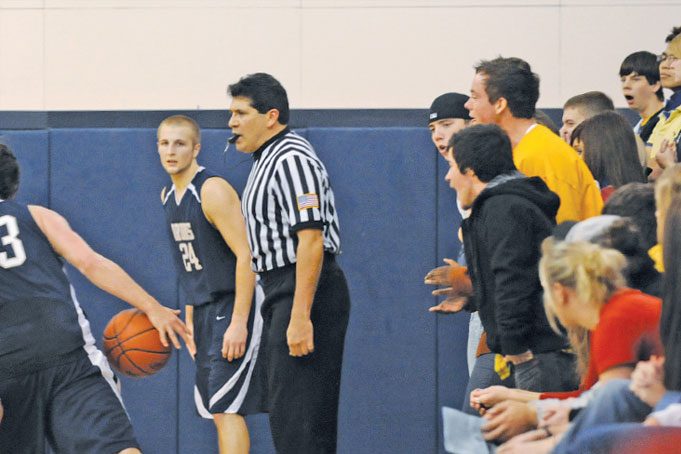Dealing with Obnoxious Fans

Between the lines, sports officials have every right and can take immediate action to eject a player or coach from a game for unruly behavior. It's never a comfortable situation, but it's the right thing for officials to do. But what about overly obnoxious fans sitting outside of those lines but within shouting distance of the court or field?
He or she is making every attempt to be heard by the officials and others about how terrible they feel the officiating is for that game. The insults might even come with finger-pointing or other physical gyrations. They might even be aimed at the opponent of his or her team.
How do officials address that guy or gal (adult, teen or adolescent)? They seem to be in every gym or stadium these days no matter what the level. How do officials discreetly chuck the bad apples, so the game can continue with some civility?
The best way to go about it is to go directly to the game manager, athletic director, game administrator, whatever title they take on for that event, and ask him or her to escort that individual from the premises ASAP. Yes, there have been high-profile situations, like longtime NCAA men's basketball official Ted Valentine going directly to a fan sitting courtside during an Auburn-South Carolina game a few years ago. Valentine pointed at the 41-year-old fan and told him to leave. The fan didn't put up a fuss.
Problem solved… unless you're not Ted Valentine. It's best to refrain from addressing a fan(s) directly. It will likely lead to more ugliness that may get physical.
Abusive behavior toward officials by fans and coaches has been the biggest challenge through the years in recruiting young or new officials. Many students or young adults will not try officiating for that reason. They don't want to deal with the abuse, period.
Many fans and coaches feel it's their "right" for various reasons to bark at young or newer officials, especially at the lower levels. In turn, those officials often are unsure of how to handle those fans or how to go about dealing with them, so they don't do anything while doing their best to ignore the abuse. Within a short time, the younger or newer officials quit because of that abuse while the abusive fans only encourage others to act the same way.
The recent nationwide officiating survey conducted by NASO concluded that abuse by coaches and parents and fans as the top reason that people quit working as referees. A recent report on abusive behavior by coaches and parents in the Duluth (Minn.) News Tribune stated that youth soccer loses more than half of its youth referees from year to year. Every year in Minnesota, about 1,700 new referees need to be trained to replace them, according to the report.
That's hardly shocking news to seasoned sports officials and officiating leaders, but it continues to be frustrating.
Unfortunately, through the years, fans have not only gotten verbally abusive with sports officials, but also physically abusive. That generally occurs at the end of the game when the officials are leaving the court or field. Without the proper security or exit plan, fans generally have a free shot to physically take out their frustrations that have morphed into an uncontrollable anger. Read the news section of Referee magazine each month and you'll come across incidents like those.
And that kind of physicality is not only reserved for the officials. Fans also will confront players and coaches during or after the game. In 2014, Hawaii men's basketball coach Gib Arnold was confronted by a fan during a game. The fan came down from about 10 rows up in the stands, ran across the court and got in Arnold's face before players pushed the fan away. The fan was eventually arrested by campus police.
What sort of things should officials point out to game management? Obscene words or drawings on placards or signs displayed by fans. Chants, cheers or taunts that embarrass, ridicule or demean participants, particularly those aimed an official, player or coach's race, religion, appearance (e.g. weight, height, physical characteristic) or nationality should not be allowed.
If trash, candy or other items are thrown onto the playing surface, the game should be stopped as soon as possible, and the material removed. If the sport is one in which officials use whistles, no one in the stands must be allowed to blow a whistle. In the case of trash or whistles, officials may ask the public-address announcer to implore the fans to cease and desist.
Whenever possible, officials are best off by expelling those types of individuals from the premises during the contest with the help of the nearest game administrator. If no one is available in that role, it's best to go directly to the home team's head coach, explain the problem and ask for his or her assistance to remove the individual(s).
Officials are expected to be focused on the game, players and coaches they are officiating at all times. However, there are times when external factors, such as unruly fans, enter the picture. Officials then must go above and beyond their officiating duties to keep order by dealing with overly disruptive outside individuals. It's never easy, but with the proper help, it can and should be done for the good of everyone involved.
What's Your Call? Leave a Comment:
Note: This article is archival in nature. Rules, interpretations, mechanics, philosophies and other information may or may not be correct for the current year.
This article is the copyright of ©Referee Enterprises, Inc., and may not be republished in whole or in part online, in print or in any capacity without expressed written permission from Referee. The article is made available for educational use by individuals.
Blake Henry
ReplyDeleteSpring 2023